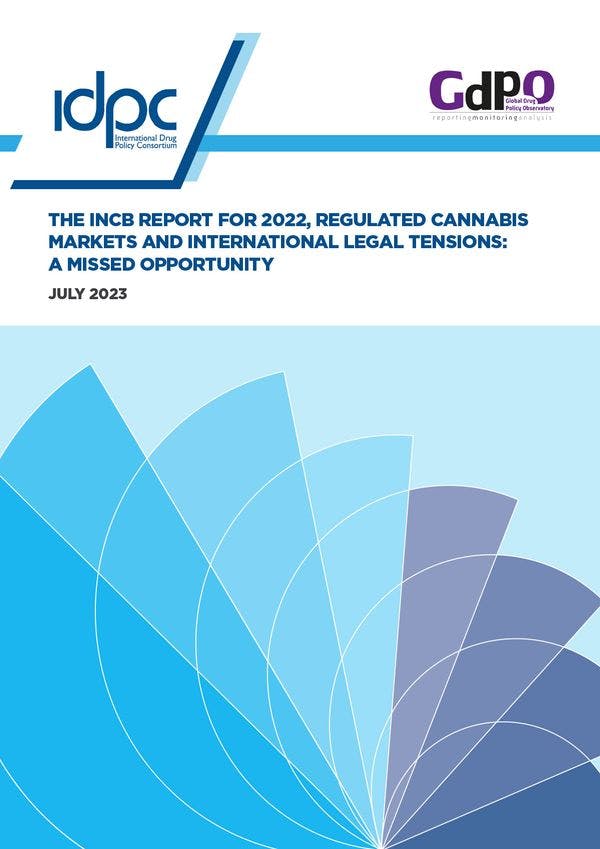Le rapport de l'OICS pour 2022 - Marchés réglementés du cannabis et tensions juridiques internationales : Une opportunité manquée
L'IDPC se félicite de l'attention croissante portée par l'Organe aux questions relatives aux droits humains et à la réglementation du cannabis, tout en regrettant la déformation des preuves sur ce dernier point, les interprétations erronées de la relation entre les droits humains et les traités relatifs au contrôle des drogues, ainsi que l'absence de réflexion constructive sur la manière de remédier à la prolifération des violations systémiques dans le régime mondial de contrôle des drogues. Pour en savoir plus, en anglais, veuillez lire les informations ci-dessous.
In its Annual Report for 2022, the International Narcotics Control Board (INCB or Board) once again presents an impressive overview of the state of international drug control relative to the provisions of the UN drug control conventions. It identifies several familiar themes and issues and includes a welcome ongoing focus on ensuring the availability of controlled substances for medical and scientific purposes. Indeed, although not without its problems, it is positive to see the Board continue to highlight the importance of human rights in the implementation of a range of drug control policies.
Mindful of the increasing attention within international discussions given to the adoption by some States of regulated cannabis markets for adult recreational use, it is no surprise that chapter one of the Report is devoted to ‘Analysis of the trend to legalize non-medical use of cannabis’. The discussion here expands on the INCB’s reoccurring attention to the issue found elsewhere within the publication. As is to be expected from such an important body within the international drug control system – and one that does much to set the narrative for inter-state deliberation – much of the analysis is balanced and fair. The Board provides a useful overview of the current state of play and many of the imperatives behind policy shifts towards what it refers to as cannabis ‘legalization’.
Such a constructive contribution to the debate is, however, seriously undermined elsewhere by the Board’s awkward approach to the topic. Beyond misrepresentation of issues, questionable tone and use of language, the Report’s attempt to present various models of regulated cannabis markets as unmitigated failures that have not achieved the objectives of jurisdictions adopting the policy approach is highly problematic. This is particularly the case since the Board ignores its own caveats concerning, among other things, complexity, research methodologies and incomparability of jurisdictions; an approach that ultimately results in eye catching, but contradictory and apparently disconnected, conclusions.
Moreover, while the Board is correct to continue to highlight to Member States the incompatibility of regulated cannabis markets with the conventions in their current form, it devotes surprisingly little attention to addressing resultant legal conflicts. It is certainly encouraging to see the Board move more into line with other parts of the UN system by embracing the flexibility within the conventions and pointing to decriminalisation of possession of cannabis for personal use as a legitimate policy choice. That said, even in the context of ‘room for manoeuvre’ within the conventions, simply repeating the ‘treaties say no’ mantra on legal regulation will not help resolve the current legal predicament. Furthermore, attempts to frame the three conventions as lex specialis is flawed and dangerous vis-à-vis the relationship between international drug control and human rights obligations.
As a creature of the conventions, the INCB once again finds itself in an unenviable position. Although the operation of regulated markets is undoubtedly a challenge to States parties and the integrity of the international drug control system, ‘legalization’ also represents a significant – maybe existential – challenge for the Board itself. In unsuccessfully attempting to force some jurisdictions to denounce regulated markets and reverse policy choices already in place, the INCB continues to find itself in a fundamental predicament that puts its very place and standing within the system under the spotlight.
Rather than misrepresenting the evidence base, carelessly deploying principles of international law and – perhaps – threatening sanction procedures, a more pro-active and positive contribution to current debates would be for the INCB to publish a special supplementary report examining the options for States to engage with regulated markets and remain within the boundaries of international law. In so doing the Board could use its considerable expertise and place within the system to stimulate discussion and explore different scenarios for the direction in which the international drug control framework could evolve considering changing circumstances and perceived needs of some Parties to the conventions.
Previous reports in this series:
- The spectre of article 14: The INCB Report for 2021, regulated cannabis markets and the board’s potential enforcement measures
- (Re)framing regime performance: A critique of the INCB report for 2020
- The INCB on human rights: A critique of the report for 2019
- The INCB on cannabis: A critique of the report for 2018
- IDPC response to the 2017 INCB Annual Report
- IDPC response to the 2016 INCB Annual Report
- IDPC response to the 2015 INCB Annual Report
- IDPC response to the 2014 INCB Annual Report
- IDPC response to the 2013 INCB Annual Report
- IDPC response to the 2012 INCB Annual Report
- IDPC response to the 2011 INCB Annual Report
- IDPC response to the 2010 INCB Annual Report
- IDPC response to the 2009 INCB Annual Report
- IDPC response to the 2008 INCB Annual Report
- IDPC response to the 2007 INCB Annual Report
